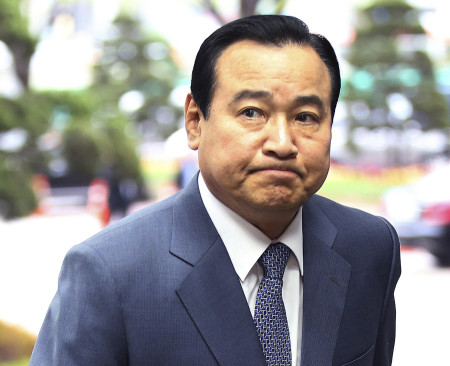South Korean Prime Minister Lee Wan-koo has offered to resign following allegations that he accepted bribes before taking office. The premier denies involvement, but the scandal could prove very costly for him.

Lee has been in office for less than three months. After becoming the East Asian country’s prime minister in February, he launched a large-scale anti-corruption drive. But in his short tenure the premier has now become a victim of a graft scandal himself.
Lee has come under so much political pressure that he had to offer to resign from his post. He informed President Park Geun-Hye about his intention to step down, said a spokeswoman for the presidential office in Seoul on Tuesday, April 21.
It’s been alleged that the incumbent prime minister and former leader of the conservative faction of the ruling Saenuri Party received $28,000 (26,000 euros) in campaign donations two years ago. The person who levelled these accusations was a former entrepreneur and official of the Saenuri Party, Sung Woan-jong, who took his life on April 9.
“Sung was facing a criminal investigation in relation to the alleged embezzlement of government funds,” Norbert Eschborn, head of Konrad Adenauer Foundation in Seoul, told reporters. He left a note with the names of politicians who were also allegedly involved in the graft case. Prime Minister Lee Wan-koo’s name is believed to be on the list.
According to media reports, eight politicians are on Sung’s list. “We can evaluate the extent of the scandal only if we knew the names of the politicians. But we assume that these people hold high positions in the government,” said Eschborn, adding that there could be some truth in the allegations.
Corruption scandals are not new in South Korea. In the past, several government officials have been accused of bribery. “Corruption is rampant in many Asian countries. For instance, this case could be called ‘anticipatory gratitude,’ which means that bribes are offered in advance to a person likely to hold a post in the government,” Eschborn added.
South Korea’s media is full of articles and editorials on the recent corruption scandal. The daily “Dong-A-Ilbo”, for example, demands that the details of donations to MPs and other election expenses be made available online in the future.
A commentary published in “Chosun Ilbo” says the scandal is proof of a “fundamental lack of honesty in South Korean leaders.” The Korean people do not expect their politicians to be perfect but “they like to see a minimum level of decency in them,” it adds.
The South Korean people are wary of constant reports of corruption scandals involving their politicians. That is the impression Eschborn has gained from his conversations with the people. “There is a problem of trust among the general public towards the political class,” he said. “This is particularly true for the country’s youth that often feel misunderstood and alienated.”
Apparently, there is a dearth of suitable candidates for the premiership post. Following the resignation of Lee’s predecessor, who accepted the political responsibility for the sinking of the MV Sewol ferry last year, Lee was not really the preferred candidate for President Park.
The repertoire of suitable candidates is thin, according to Eschborn. “It became clear last year when the president was looking for a new prime minister. At that time, a number of candidates could not make it to the final round because they didn’t have a good reputation.”
Park Geun-hye has been following the recent developments away from home, as she is away on a Latin America tour. But Eschborn believes this is a political mistake on her part. The president will come under more pressure due to the scandal at a time when she is also facing criticism over the ferry disaster, says Eschborn.
Experts say that the fact that there will soon be a third prime minister in South Korea within a year would definitely give the impression of a weak leadership. Park has yet to approve Lee’s resignation, though she is likely to do so. But then there is a more difficult task ahead for her: finding Lee’s successor.








